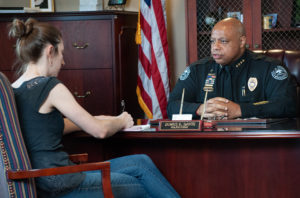
Left: Interviewing Jackson Police Chief James E. Davis for our cover story.
Do we want to be made well?
This issue marks the start of the second half of 2020. Let’s hope it’s better than the past six months.
First off — and if you’ve forgotten this, it’s understandable — wildfires hit Australia, and flooding hit Mississippi. Both of those disasters happened before COVID-19 forced us into isolation. Before we watched a Minneapolis police officer murder a man accused of using a fake $20 bill.
Here are two statements I think we can all agree on:
• The killing of George Floyd was unjust, inhumane, and unacceptable in every sense of the word.
• Any true definition of justice ought to include equal treatment under the law for
all races.
Those two statements might be the only things we can agree on, according to my Facebook and Twitter feeds. Between flags, statues, riots and police walk-outs, we’re not unified on much of anything right now.
I don’t just mean we disagree — I’m pretty sure that’s unavoidable, to an extent. I mean that even among professing Christians, we don’t respect each other enough to listen; we won’t stop proving ourselves “right” long enough to show compassion; we won’t even look at new information if it contradicts what we “know.”
Do we want to be made well?
Jesus asked that question of a paralyzed man before healing him (John 5). He’s asked it of me when I’ve been paralyzed by anxious thoughts. I believe He might be asking it of the church now.
Maybe you’re thinking, “Hey, I’m not part of the problem. I love the Lord, and I don’t post hateful things on social media.” That’s good! But what affects one part of the Body of Christ affects us all. And if the church is sick, we don’t just need to avoid drinking rat poison. We need medicine.
I’m still figuring out what kind of medicine I need, both to take and to administer. So I don’t know the exact answers for each person reading this. But here are a few things that are helping me, and that can help us all love God, love our neighbors, and start healing a divided church:
• Pray, and read your Bible. If we ask God for wisdom, and ask in faith, He’ll give it to us (James 1:5). So we can follow Him in wisdom at every step. Also, carve out some time in your day to read your Bible, even if it’s only 15 minutes. God recently put me in the book of Proverbs, and it truly has been like honey to my lips (Psalm 119:103) — a spiritual palate cleanser.
• Be willing to accept conviction and correction. Ask God if you’ve done, said or posted anything to hurt anyone, especially (but not limited to) another believer. It doesn’t matter who started it, or who’s right and wrong in the original argument. Stop what you’re doing, go to that person and sincerely apologize. (Matthew 5:24)
• Seek wisdom from other believers. If you’re unsure what to do or say in our current cultural climate, talk to folks who love 1) Jesus and 2) people (not just one or the other). Ask them your tough questions, filter their answers through the Word of God, and see if you can learn from them.
• Get to know someone different than yourself. Try having a respectful, truthful conversation with one believer who’s different than you — whether racially, politically, socioeconomically, etc. Listen to their experiences and get to know them. Regardless of your differing opinions, start out assuming this person is seeking to follow Christ, just like you are. These conversations can develop mutual empathy and trust. If you’re at a loss on where to start, contact Mission Mississippi at MissionMississippi.org.
• Don’t rush. If you’re feeling prompted to take action, ask yourself: Will your action (or post, or message) be loving, truthful and helpful? Are you about to take action, post a hashtag, or send a message with good intentions (and not merely out of fear, anger, obligation, or a restless compulsion to “do something”)? Have you asked God for wisdom (see first bullet point)? If you answer “no” to any of the above, hit pause.
• Be open to changing your mind. Are you willing to adjust your assumptions when you learn new information from a credible source? I hope I can be. (If no one ever did, we’d have no believers in the empty tomb of Christ, and thus no Christians!) This means doing your research and not believing everything you read on social media. It also means being willing to follow God in acting on what you learn.
July ‘must-reads’
• Our cover story on Jackson Police Chief James E. Davis
• Our Lagniappe story on the late Dr. Joseph “Joe” Cole, who leaves a legacy of faithfulness at Hartfield Academy
• Chris Fields’ Health and Wellness column

